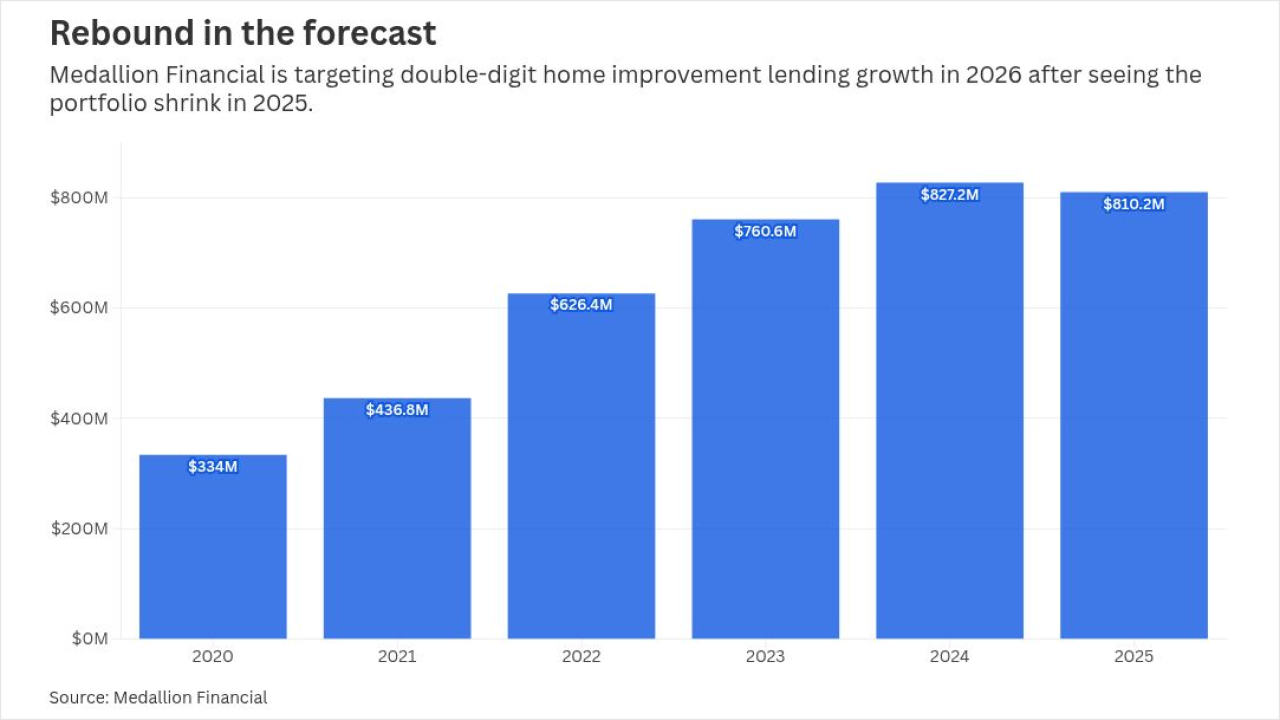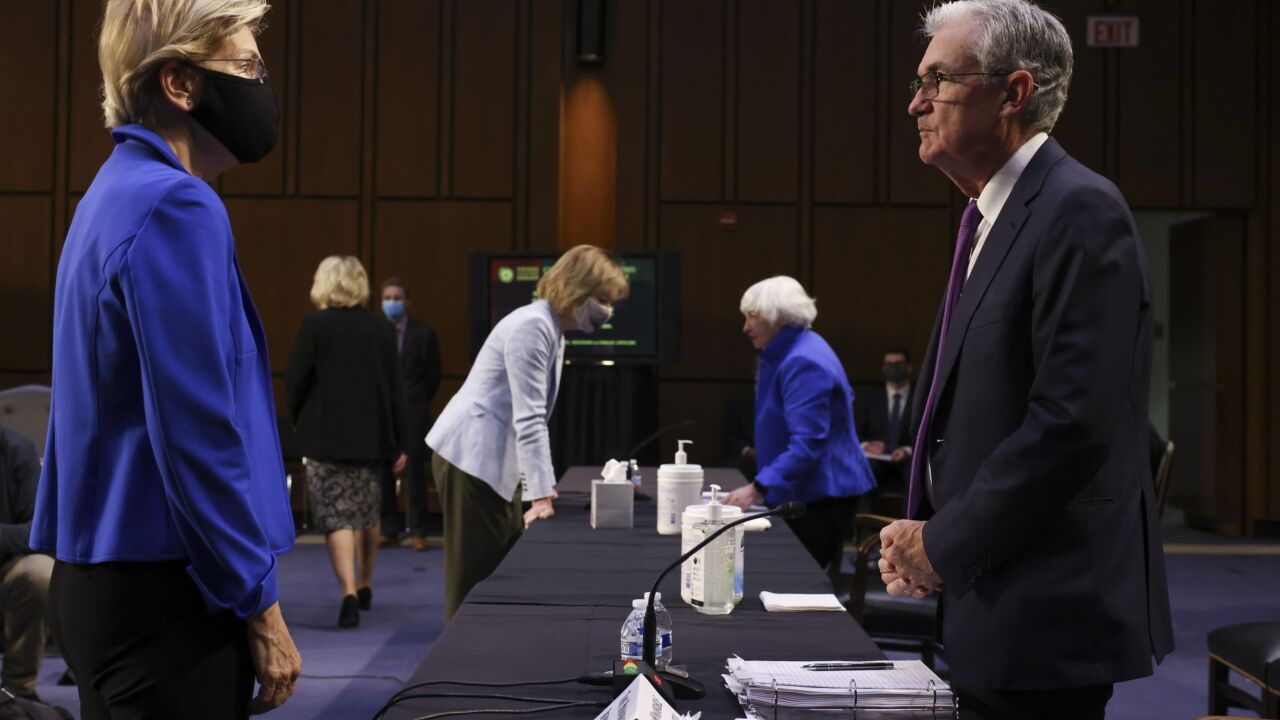-
More than a year into his leadership atop the powerful banking panel, it's still unclear whether Rep. Jeb Hensarling is willing to trade his ideological beliefs for the messy reality that is dealmaking in today's Congress.
April 10
WASHINGTON A senior lawmaker's bid to take the Financial Services Committee gavel from Chairman Jeb Hensarling, R-Texas, is unlikely to prove successful, but the effort could still have far-reaching implications for House Republicans.
Rep. Frank Lucas, R-Okla., whose term as chairman of the Agricultural Committee expires at the end of the year, suggested that he is considering a run at the top spot on the banking panel in an interview with Politico last week.
But it remains an uphill battle for Lucas to win, given Hensarling's position in what is already a fractured Republican caucus. There's little upside for leadership to further rock the boat.
"There's no reason to doubt that Jeb Hensarling will be chair of the Financial Services Committee in 2015," said Isaac Boltansky, a policy analyst at Compass Point Research & Trading. "Lucas is an incredibly respected lawmaker and has a great track record on House Agricultural Committee, but it would take a massive political and policy push to get Lucas the gavel."
Andrew Duke, Hensarling's chief of staff, said in a statement Monday that the lawmaker "has already secured the support and votes" from Republican leadership to hold onto the chairmanship. A spokesman for Lucas did not respond to requests for comment.
The Oklahoma Republican said in his earlier interview that he and several members of the committee are frustrated with current leadership and the lack of progress reforming the Dodd-Frank Act.
Rumors have swirled for months that rank-and-file members on the committee bristle under Hensarling's strict control of the committee agenda and the hearings process, but news of a possible insurrection still took many industry observers by surprise.
While it's unclear whether Lucas will go forward with the bid, even the hint of a challenge is likely to impact House Republicans and the committee in several ways. Perhaps most significantly, it potentially weakens Hensarling's power negotiating within his own chamber and with his Senate counterparts.
"The fallout is that the Financial Services Committee could be further marginalized compared to the Senate Banking Committee when the gavel passes to a new and more active chairman," said Brandon Barford, a partner at Beacon Policy Advisors.
"When there's this level of grumbling and even talk of a change in leadership it is a distraction and the committee is taken less seriously."
He added: "Unless Hensarling can reach out and get buy-in from some of these disgruntled members, his authority could weaken significantly. It is rare to have members encourage a leadership challenge like this, even if it was only done privately and remains highly unlikely to succeed."
It's possible the threat of a challenge could even help to sway Hensarling at the margins to become more of a dealmaker. Critics have complained that he's failed to be successful in striking compromise on a number of key bills, including reform of Fannie Mae and Freddie Mac, changes to a recent flood insurance law and the reauthorization of terrorism risk insurance.
"There's going to be a push by GOP leadership to have Hensarling move into the realm of being a dealmaker," said Boltansky, though he warned that the Texas lawmaker's "ideological underpinnings will make it incredibly difficult for him to abide."
More significantly for Republican leaders, the threat of losing his committee is likely to stop Hensarling from considering a run for party leadership in the near future as he works to shore up his position as chairman. The Texas Republican has been on the shortlist of possible successors to House Speaker John Boehner, R-Ohio, and other Republican leaders, for several years.
If he keeps his seat, he will also likely come away indebted to Boehner and House Majority Leader Kevin McCarthy, R-Calif., who have an outsized vote on the House Republican Steering Committee, which will appoint committee chairmen in December.
Alternatively, if GOP leaders were to strip Hensarling of his role on the Financial Services Committee, he'd have much more incentive to make life difficult for senior lawmakers.
"If he has his committee taken away, what does he have to lose by challenging leadership?" said one banking lobbyist.
Lucas' move against Hensarling could also help shape the structure of the banking panel itself. According to several sources, the Oklahoma Republican's bid followed efforts to secure a subcommittee chair position on the banking panel after he steps down from leading the Agricultural Committee at the end of the year.
"This seems to be at least partly based on Lucas being termed off of the Ag Committee how much of this is because he has nothing else to do soon?" said Mark Calabria, director of financial regulation studies at the Cato Institute.
Banking sources say it's not clear whether Lucas was denied a subcommittee chair spot or was frustrated when he wasn't affirmatively offered a position immediately, perhaps on the highly sought-after financial institutions and consumer credit subcommittee. Rep. Shelley Moore Capito, R-W.Va., is expected to win an open Senate seat next month, vacating the top seat on that subcommittee.
His public declarations raising concerns about the banking panel make it hard to believe Lucas will be getting a subcommittee chairmanship, leaving room for other members to take on leadership roles under Hensarling. There's likely to be significant shuffling among those seats next year, though final selections are likely several months away.





